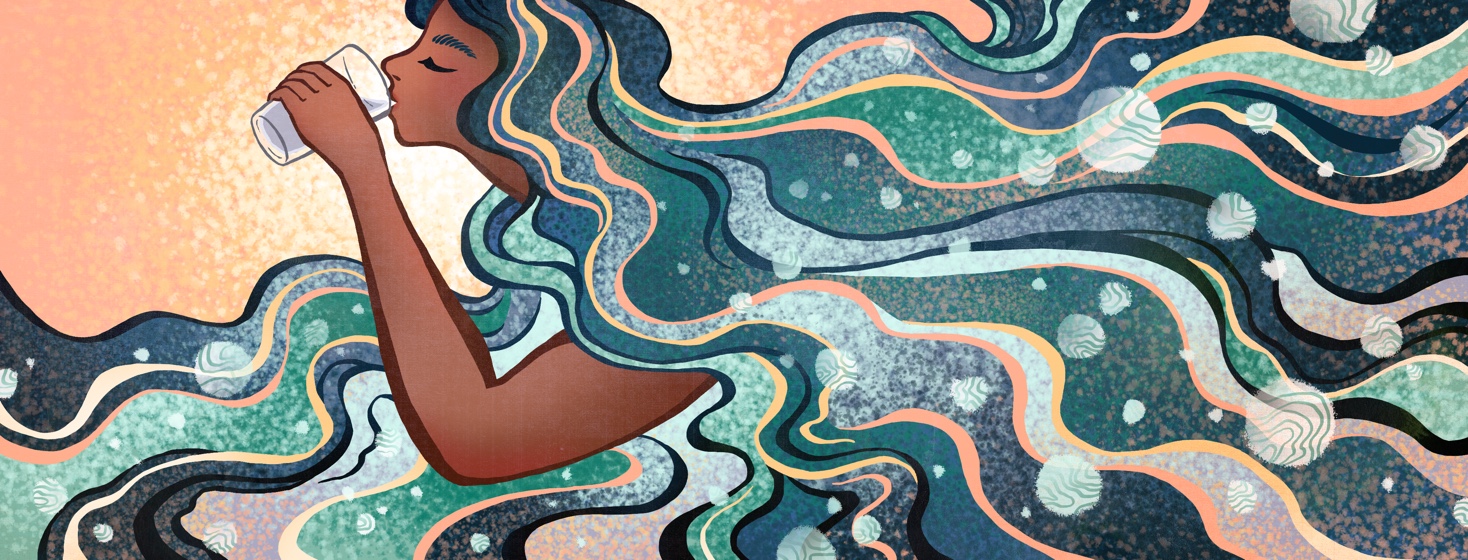To Drink, or Not Drink, Water for the Skin
At the end of a travel day in the holiday season, I wanted a cup of coffee when I got to the hotel room. I was tired, and I figured it would perk me up.
The hotel didn’t have coffee in the lobby. I was not happy. I’m a coffee drinker who likes good coffee when I get to a place. I figured I would make some in my room. Just as I was making it, I had a thought. I wondered if my fatigue resulted from dehydration, which I figured coffee would only make worse. The coffee was bad anyway, so I threw it down the drain and drank some water.
Is drinking water good for your skin?
It’s just as important to stay hydrated in the winter as it is in the summer. But I forget to drink as much (water) as I should. I imagine I’m not alone. Sweating in the warmer weather is a reminder to do it, and with sweating less, we have to remind ourselves.
Keeping hydrated plays an important role in the electrolyte balance needed for health and energy. I figured it was also important for the skin, but opinions, and research, are all over the place with this one. It seems to make sense that if your body is not hydrated, your skin is going to get dry. I have naturally dry skin anyway, so I figured that dehydration would make it worse. This is not a problem like skin cancer, but still, dehydration can lead to other serious problems.
The dangers of dehydration
Being in a rush, or traveling, or not feeling well, are times when you might forget to hydrate. One time when recovering from my first stem cell treatment, I carried a water bottle around the house...but forgot to drink from it. I got so dehydrated that when walking my dog, I fell over backwards and hit my head, earning a trip to the emergency room.
The fall was preceded by the oddest feeling. It seemed like my feet were getting stuck in wet cement. I had trouble picking them up. Eventually, I couldn’t pick them up at all. And that’s when I fell. I never knew why my feet felt that way, but when I got to the ER and got hooked up to fluids, I learned that the dizziness was from dehydration.
Conflicting research on water and effects on skin
One of the benefits of having the internet at our fingertips is the ability to find so much information. But too much information, information overload, can also be confusing. One study can contradict another.
A 2015 study in the journal Clinical, Cosmetic and Investigational Dermatology found that drinking water helps the skin.1 But a multi-decade study on aging by the American Academy of Dermatology concluded that while sun exposure played a role in youthfulness (or lack thereof) in facial skin, water consumption and other lifestyle choices did not.
The hydration obsession
I like drinking water, so I’m leaning in favor of the studies that say it does help the skin. Which does not mean I want to be constantly guzzling it. Too much water can lead to hyponatremia, a condition in which the sodium content of your blood is diluted and your kidneys can't excrete the excess water. For some people, who carry a water bottle everywhere, the goal of staying hydrated seems to have turned into an obsession.
So how much water should we drink?
Apparently we can just let our thirst guide us. Most of us have heard the recommendation to drink eight 8-ounce glasses of water a day.2 But although it’s easy to remember, it’s not the prevailing wisdom anymore.
The New York Times reported that it’s a myth stemming from a 1945 Food and Nutrition Board recommendation that said people need about 2.5 liters of water a day (about 10 cups). But it also said the quantity could come from foods and other beverages. Even coffee.3
Other ways to keep your skin hydrated
Dry skin can be a sign of dehydration, but according to another story debunking the eight-glass myth, “Once you are well hydrated, drinking more water will not make your skin dewier. Eating enough good-for-you fat from fish, nuts and healthy oils is more likely to help with that.” Certain fruits and vegetables, such as watermelon, can also help you meet your water quota.4
But back to my switch from coffee to water in the hotel. It’s true that water is more hydrating than coffee. If I had known, though, that coffee was okay before I did this research, I might have gone out in search of a better cup...and had the coffee WITH the water so that I would have covered all my bases.

Join the conversation